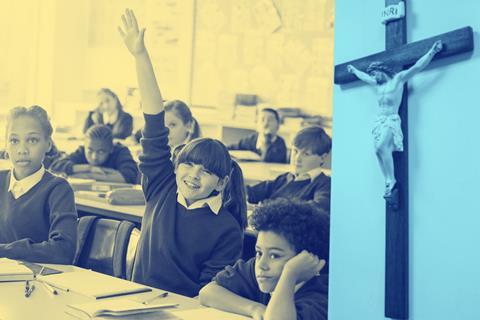Two mums argue the case for and against a ban on faith based admissions being imposed

In early June a UN committee called for religion be banned as a criterion for school admissions in England. In a new report, the UN Committee on the Rights of the Child (CRC) has urged schools to end religious selection for admissions in a bid to create a fair and inclusive education system. Around one third of state funded schools in England have a faith designation.
Two parents have opposing views on the issue. Dawn Savidge argued for the ban and the second arguing against preferred to remain anonymous in case her school was identified.
FOR A BAN
Is now the time to evoke change? If you had asked me that question a year ago, my answer would be no. But now I would say that it is!
‘Pray or pay’. It seems these are the only two options to guarantee that your child is allocated a place at a ‘good’ school. Is it fair to mix up faith and school? Surely it obscures the gospel which is freely available to all. And how many people are put off by this system of enforced church attendance and miss out on exploring faith for themselves?
During my time as a Diocesan Children and Youth Advisor, I had the privilege to work beside many of these ‘assigned’ churches that were linked to their local high schools. There would be an influx of young families every September followed by a mass exodus of families whose children had now got a place in their chosen school and no longer ‘needed’ to attend church. This was mixed with a varying response from both the congregation and vicar. Some knew that the families were only there for one reason and so kept them at arm’s length, not fully engaging in fellowship with people who were ‘playing the system’. Some, me included, were filled with sadness that the church and its people weren’t doing more to include, excite and retain families who had initially walked through the door as an obligation.
Just recently I met a mum and her young daughter. They were at a children’s choir run by the local Baptist church. Intrigued as to whether this outreach missional activity was working, I spoke to them about their faith. Like many parents, they had attended the local assigned church to enable their child’s entry into the local high school. Once their child had a confirmed place, they left as fast as they could, but not to leave the church, but instead go to a church that was ‘more fitting to (our) family’s needs’.
Deuteronomy 11:18-21 gives direct instructions to parents to teach God’s word to their children. It doesn’t ask our Sunday Kids leaders or schoolteachers to do this. Yet slowly over the past century, we have moved into passive religiosity. We expect those in teaching positions to feed us and, dare I say, churches have become reliant on an influx of people when their doors are open. We have lost the passion to seek the lost, the brokenhearted and to preach the good news everywhere, not just in church on a Sunday.
The evidence is plain, schools are moving into a more secular space. I am grateful for the origins of Ragged Schools, and the positive influence that Christians have had in shaping schools. However, maybe now is the time to leave the comfort of our Sunday pews and seek the lost and the brokenhearted in our communities. God is way too powerful to be shut out of a school by policies. He is there in the teenager who finally sees their worth in Christ. He is there in the sixth form student who just got off stage on a Sunday where he was leading the congregation in worship. He is there amid a friend comforting another one who is lost and broken. God and His people will not be silenced.
AGAINST A BAN
Romans 12 tells us not to be conformed to the patterns of this world, but instead to be transformed by the renewing of our mind.
I love these verses – they’re a great reminder of the call on our lives to look and be different and to allow God to transform us into His likeness.
But the reason I start this with these verses is that it’s another reminder to me - we are all being formed by something(s), whether consciously or not.
Spiritual formation refers to the processes and practices by which we are intentionally formed. If I don’t intentionally choose to be formed through the choices I make, my practices, disciplines (or lack thereof!) then I’m formed unintentionally by culture around me and my own preferences.
This isn’t something dull and restrictive, but instead an opportunity to deliberately step into things which allow space for God to transform me.
I want to do what I can to be formed and shaped into who God created me to be NOT by being, or in order, to be separate from the world, holed up in a hermit type existence, but instead to free myself to operate with choice. And to use that choice to root myself in principles and practices that equip me to be in, celebrate, bring life to and in the world, celebrating people, creation, mankind and culture but rooted in God’s truth, the place where I am being formed from.
I find this challenging enough for me.
As we had children gifted to us to raise, that challenge increased including as we considered where they might go to school.
Perhaps where there is a choice for our children to attend schools where the selection process partially includes a faith based decision this could be a positive part in their formation? What I’m not saying is that it’s only possible in these contexts.
For us, the opportunity for our children to attend such a school has been positive, protective and releasing for them (and us).
At the end of primary school our children were surrounded by people and situations that many of us could never have imagined at a similar age (or perhaps still yet within our own experience). This was in the context of a school and system wrestling with incredibly challenging issues in a culture which is changing faster than legislation or frameworks can keep pace with.
I acknowledge that as parents, our default can be to want to remove our children out of any difficult situation and shield them from any harm ever. I have learned that this is not helpful long term, and that my job is to raise children confident to be in the world and stand firm on what they believe is right. I pray that this is on the foundation of God’s truth and ways.
Let me say again, I believe it’s possible to do this with children in a mainstream setting.
But with the opportunity for them to attend a great school rooted in faith principles aimed to equip them for the rest of life, it’s a choice that I am grateful for (and acknowledge it’s not one open to everyone).
In my experience, it is easier to build strong foundations in today’s culture at a pace where they’re more likely to be built to last, in an environment where there’s some shared agreement about approach that is at least partly rooted in faith.
Most children and families that attend my children’s school have a shared or similar belief or moral framework at least as a starting point, specifically when it comes to what is shared and taught, and how.
This doesn’t mean there is always agreement (far from it), that the pupils (or adults) are a homogenous group but there are certain values that choosing a school where faith is a part of selection, does bring unity in to some areas than perhaps is possible in a non-selective school.
My experience is not that the pupils (or adults!) are in any way more angelic or removed from challenge, but that there is a different starting point from which education happens. This includes understanding and valuing people of other faiths and none, exploring gender identity, sexual orientation, pornography, consent and any other vaguely ‘contentious’ issue you could name. What it does is gives permission for some boundaries to be drawn.
And whilst I will continue to love, accept and welcome my children always regardless of how their personal beliefs develop, as part of my responsibility as a Christian parent, I want to set them to be formed into His likeness. I acknowledge that the school they attend provides a small buffer to the onslaught that can happen in other schools, but I’m OK with that because I’ve seen the confidence it’s brought them and the breathing space it’s allowed (them and us) to be curious about learning, from geography and maths, to gender politics and identity.










































